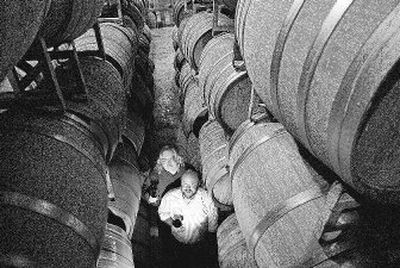Grande Ronde wins accolades

Dave Westfall, winemaker at Grande Ronde Cellars of Spokane and devoted hockey fan, has scored the equivalent of a hat trick in the world of wine.
Westfall and winemaking partner John Mueller have earned three scores of 90 points or higher from Wine Spectator magazine for successive releases.
Repeated high scores show a consistency of quality in Grande Ronde wines, and the ratings put them in the company of Washington’s top wineries.
Grande Ronde’s 2001 merlot from the Seven Hills vineyard in the Walla Walla area was rated at 91 on the magazine’s 100-point scale. Both Grande Ronde’s 2002 cabernet sauvignon from the Seven Hills vineyard and 2003 Cellar Red blend of cabernet and grand vidure grapes garnered ratings of 90 points. The 2002 merlot also received a respectable 89 rating.
The publicity has led to requests from fine restaurants and wine shops to stock Grande Ronde, which produces 1,500 cases of wine a year.
The winery’s two single-vineyard, single-grape varietals also are likely to find favor with wine drinkers who want to taste a reflection of climate and soil from a specific location – or “terroir,” as the French call it. Seven Hills vineyard is one of the places in Washington state acclaimed for its terroir.
Unlike many other wineries, Grande Ronde ages its wines for two years after bottling, ensuring that flavors and tannins have softened and combined, making them pleasant-drinking now and worthy of cellaring.
“We want people to be able to take them home and have them, with food, in the near future,” Westfall said.
Grande Ronde was started in 1997 as a spinoff from Spokane’s successful Mountain Dome Winery, well-known for producing top-quality, affordable sparkling wines done in the Champagne method.
Mueller grew up in the same family as the late Dr. Michael Manz, a Spokane psychiatrist and founder of Mountain Dome who died last fall.
Mueller said he and Manz were raised together and considered each other brothers. They grew up in Minneapolis, where both attended Augsburg College. Mueller is a geriatric social worker.
“You feed off the energy,” Mueller said about being part of a family operation.
But losing Manz was an emotional blow. “It’s a huge void, no doubt. He was one of those larger-than-life figures,” Mueller said of Manz.
Manz also carried their vision of building distinctive reds, said Westfall, who has been involved in the wine business locally since 1980. He also is a business investor.
Dave Page, a University of Notre Dame classmate of Westfall’s, is involved as an investment partner.
Success was no accident. The three winemakers hired the consulting services of one of the top winemakers in the world, David Ramey, whose resume includes time at the ultra-expensive Petrus winery in Bordeaux, France, and later at Dominus in Napa Valley, Calif.
Grande Ronde has been leasing three dozen rows in the Seven Hills vineyard south of Walla Walla and another 10 rows at Pepperbridge vineyard, both considered among the best in Washington state.
By buying the same rows every year, Grande Ronde has control over how the grapes are grown.
“They (the grapes) are ours from Day One,” Westfall said. “We tell them how to prune them.”
Instead of producing heavy yields of 6 tons an acre, the rows are pared back to about 2 tons per acre, a practice that increases the intensity and potential value of the fruit but also makes the wine more expensive.
In September, the green grapes on each cluster are removed by handpicking to reduce the chances that vegetal flavors will diminish the wine quality, Westfall said. When handpicked at harvest, the crop is worth about $4,000 a ton.
“It really does make a difference,” Westfall said.
Grande Ronde’s top reds sell in the $30 range, a competitive price compared with other wines in their class.
Once in Spokane, the stems are removed and the grapes are cold-soaked for two days to increase extraction of color and flavor. After fermentation, the solid portions, or “lees,” are pressed gently at the equivalent of one atmosphere, which prevents harsher tannins from seeds and skins from getting into the wine.
Aging is done in French oak barrels made from trees at least 75 years old, and the wood is air-dried for three years.
The cooper toasts the insides to a medium color, which helps create some of the classic dark flavors such as coffee or cocoa. Using fine oak also provides additional soft tannins that are pleasant on the palate, not harsh like less-expensive wines that might be made with oak chips, Westfall said.
After oak aging for 14 to 18 months, the wine is strained – not filtered – to help it retain intensity.
The 2001 merlot has distinct dark cherry, herb and coffee flavors with a long, toasty finish. The cabernet shows off plum and cherry flavors and a hint of spice or mint that is characteristic of Seven Hills vineyard.
The wines echo a slight dustiness from the soil that is considered a trademark of the finest wine.
In the cellar, the cabernet and merlot are likely to age for up to 15 years from vintage date, Westfall said.